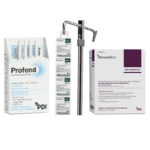Interventional Care


We notice that you are visiting us from . This site only services US-based visitors. Would you like to visit the site that is appropriate for your location?

According to the Centers for Disease Control and Prevention (CDC), several COVID-19 variants are circulating globally. Most recently, the variant that emerged in the United Kingdom (UK) in September has now been detected in numerous countries, including the United States and Canada1. While this variant (referred to as SARS-CoV-2 VOC 202012/01 or B.1.1.7.), does seem to spread more easily and quickly, there is no evidence that it causes more severe illness or increased risk of death1.
As information continues to emerge, scientists are working to learn more. PDI reached out to our Research and Development Director of Laboratory Sciences, James Clayton, to answer some top-of-mind questions regarding the science behind new virus variants.
Q. The SARS-CoV-2 variant emerged in December in the United States, approximately one year after the start of the pandemic. Is it common for viruses to mutate?
Clayton: Yes. All viruses, including SARS-CoV-2, change over time. The potential for virus mutation increases with the frequency of human and animal infections2.
Q. Can you elaborate a bit more on how and why viruses mutate?
Clayton: Viruses constantly change through a process called antigenic drift. As is the case in all RNA viruses, mutations occur frequently because the virus’ replication machinery does not have a proofreading mechanism. As the virus replicates within cells, the new copies are not exact genetic copies and thus new variants arise. Most mutations occur by chance and have no bearing on the virulence factors of the virus, however some mutations or an accumulation of mutations have a direct benefit to the virus in terms of increasing its infectiousness or transmissibility2.
Q. Is there anything unique with the mutations happening with SARS-CoV-2 virus?
Clayton: Yes. SARS-CoV-2 is unique and the changes scientists are seeing are specific to this virus. There are a total of 23 nucleotide mutations with the new variant seen in the UK. Early evidence indicates that mutations in the N501 region of the spike protein increases the binding affinity to human cell ACE2 receptors. It is this increase in efficiency that may be helping the new variant become more transmissible.
Q. Is there any reason to believe that the surface disinfectants recommended by the EPA (on List N) or approved for use against SARS-CoV-2 will not be effective against mutations of this virus?
Clayton: The mutations are believed to help the virus attach more efficiently to human cells, potentially aiding transmissibility. There is no evidence that the virus will behave differently to disinfection. Infection prevention measures, such as environmental cleaning/disinfection, physical distancing, hand hygiene, and wearing of PPE, including masks, are still critical in reducing the risk of transmission. The CDC continues to monitor virus variants and will keep the public updated on changes as needed.
For more information on the PDI Products that are on EPA List N and have the SARS-CoV-2 claim, click here.
1 https://www.cdc.gov/coronavirus/2019-ncov/transmission/variant.html
2 WHO Disease Outbreak News 31 December 2020)